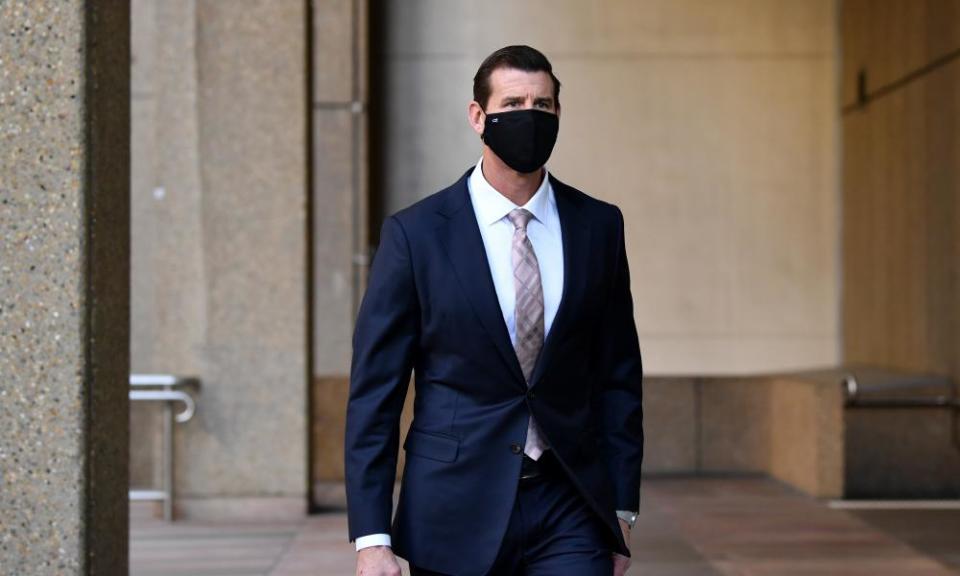Ben Roberts-Smith defamation trial could be delayed until November

Ben Roberts-Smith’s already delayed defamation trial appears set to be postponed further by Sydney’s escalating Covid-19 outbreak, with hearings set for another adjournment, possibly until November.
Three Afghan witnesses will continue to give evidence from Kabul this week, but beyond that, the trial appears to face months of inevitable further delay.
In court on Wednesday morning, lawyers for both Roberts-Smith and the newspapers he is suing for defamation speculated on Monday 1 November as a potential date for resuming the trial.
Roberts-Smith, a Victoria Cross recipient, is suing three newspapers for defamation over a series of reports he alleges are defamatory and portray him as committing war crimes, including murder.
Having received information from the commonwealth government regarding the national security sensitivities of the trial, Justice Anthony Besanko indicated he was unwilling to move the trial from Sydney to another city, and nor could the trial proceed with witnesses giving evidence by audio-visual link.
The major barrier is bringing witnesses to Sydney – currently under lockdown – to give their evidence in person. Most of the witnesses to be called are serving or former SAS soldiers based in Perth, who would be unable to return to Western Australia should they come to Sydney.
Arthur Moses SC, acting for Roberts-Smith, said the trial could “not be allowed to drag on” indefinitely, having already been delayed a year by the global coronavirus pandemic.
“There has to be a date of reckoning in respect of these allegations,” Moses said. “Some of these events occurred as far back as 2006, these publications were made in 2018.”
Moses said if witnesses were required to quarantine in order to be able to give evidence in person “that very may well be the price they pay”.
“My client has been subject to serious allegations thrown around like confetti for a number of years … the least these witnesses can do is to answer a subpoena, or explain why they can’t.”
Nicholas Owens, SC, for the newspapers, said Covid-19 restrictions might make it onerous, if not impossible, for some witnesses to give evidence. He said if he was prevented from calling his witnesses – including 21 former and serving SAS soldiers – “we may well be denied a fair trial”.
“It’s not just the applicant that deserves a fair trial, it’s my clients too.”
Justice Besanko has reserved his decision on any further postponement of the trial.
The court has heard this week from Afghan national Mohammed Hanifa Fatih, who has told the court he saw a “big soldier” from the Australian SAS kick his handcuffed uncle, Ali Jan, off a small cliff in the village of Darwan during an SAS raid in September 2012.
Ali Jan’s body, suffering gunshots, was found later in a nearby field.
The Uruzgan village is the site of one of the key allegations made against Roberts-Smith: that he murdered Ali Jan, by kicking him off a small cliff then shooting him, or ordering a subordinate to shoot him.
Roberts-Smith denies this, earlier telling the court that on that day he shot at an alleged “spotter” about two metres away during a firefight. He says the killing was lawful under the soldier’s rules of engagement.
A second witness from Darwan also appeared before the court on Wednesday, by video-link from Kabul.
Man Gul said he was detained in Darwan by the Australian troops alongside Ali Jan and Hanifa. His evidence detailed the arrival of Australian troops and being detained by the soldiers.
Australian soldiers were in Darwan searching for rogue Afghan National Army soldier Hekmatullah, who had murdered three Australian soldiers a fortnight earlier.
Gul told the court he was hit in the head with a pistol while being interrogated and asked repeatedly “where are the Taliban?”. Gul said he didn’t know. He said he was also hit for “looking at the big soldier”.
Earlier, during Hanifa’s cross-examination, he was questioned whether he had been coached about what to say, and whether he had been paid to give evidence or was seeking compensation.
“Everything you’ve said about the events on the day in question has been a fabrication hasn’t it?” Bruce McClintock SC, for Roberts-Smith, said.
Hanifa strenuously denied all accusations of impropriety or of giving false evidence.
“No one has told us [what to say] ... no one has talked about receiving any compensation … we are witnesses, we are just testifying, I am not worried about the paying of money.”
Asked repeatedly if Ali Jan held any connection to the Taliban, Hanifa passionately defended his slain uncle.
“Look brother, I am a witness, I am not afraid of anybody, even if I die I will tell the truth. You know this is the Pashtun custom, it is the tradition and it is the law. If you witness something like a crime you have to testify about it, even if somebody wants me to go to Australia or to the US I will go there and testify, Ali Jan was a labourer, he was a labourer, he was a labourer.”
The trial was originally scheduled to hear from four witnesses from the village of Darwan, but only three will now appear.
The fourth witness, known as Bora, is stranded in a village near Kandahar and cannot reach Kabul to give evidence because of increasing Taliban violence across Afghanistan, in particular control of key roadways.

 Yahoo Finance
Yahoo Finance 